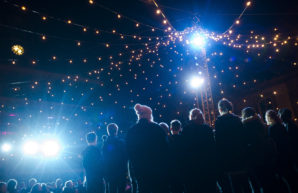Raising Your Voice – Scandinavian Style
Posted by Sandra Wood on 10 January 2020
Book a place on Loz’s singing workshop here
Often when I talk to people about community singing, they respond “oh I don’t / can’t sing”. The response is a bit like I’d suggested they do a quick spot of brain surgery or sketching out the mathematics of infinite universes in their lunchbreak.
Even though taking part in amateur choirs (for example) is a very popular pastime, in general singing tends to be seen as a specialist activity. It’s easy to compare yourself to recorded studio products of well known stars and think you’re a bit “lacking”. In the UK, the idea of coming together to sing as part of daily life and culture is increasingly marginalised.
Sure, most of us do know some Christmas carols, and football crowds still belt out enquiries as to who ate all the pies. But as a rule, vocals are seen as something for professionals. We more often talk of a music “industry” than a music “community”.
To varying degrees, this is often the case all over the world. However, I was struck while living and working in Denmark that the Scandinavian and Baltic countries still take a bit of a different attitude to song. In Denmark, no significant birthday or wedding is complete without some of the attendees writing lyrics to a well-known melody for everyone to sing along to at the event.
When I got married friends managed to come up with something based on Abba’s Waterloo … The “Folk Highschool Songbook”, a collection of folk songs, hymns and contemporary songs still has a key role in Danish culture, many meetings, including political ones, starting with a melody from it. The point of all of this is not to sound like the latest star of whatever X Factor competition is on telly. It’s about shared community and celebration.
In the Baltic countries of Estonia, Lithuania, and Latvia song has played a significant role in recent history. While they were still part of the Soviet Union choral singing, collecting and arranging folk music was an important part of preserving national identity and language. Indeed, for Estonia vocal music played a vital part in the downfall of the Soviet Union. The events between 1987 and 1991 which led to independence were dubbed the “Singing Revolution” following mass evening singing demonstrations at the Tallinn Song Festival grounds. During Estonian song festivals the audience can reach 100,000. Not bad for a country with a population of 1.3 million. Once again, the point is about shared culture.
This is why I’ve been looking forward to sharing some of the songs I learnt and collected in Scandinavia and the Baltic countries in our latest “With One Voice” day workshop. Some of this material comes from the very first project I did for More Music back in the 20 naughts so it seems appropriate.
I think it is worth remembering that this is a key role of singing, to bring people together. Perhaps politicians who talk of ‘healing the nation’ might like to remember that. It’s about giving voice and sharing voice. And we all have a role in that.
